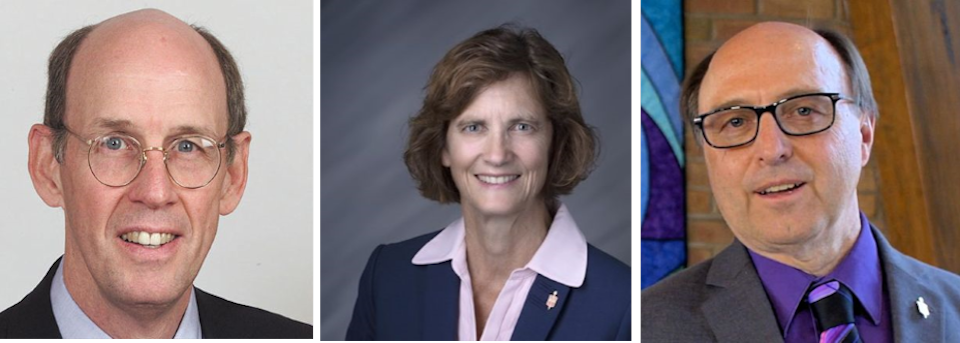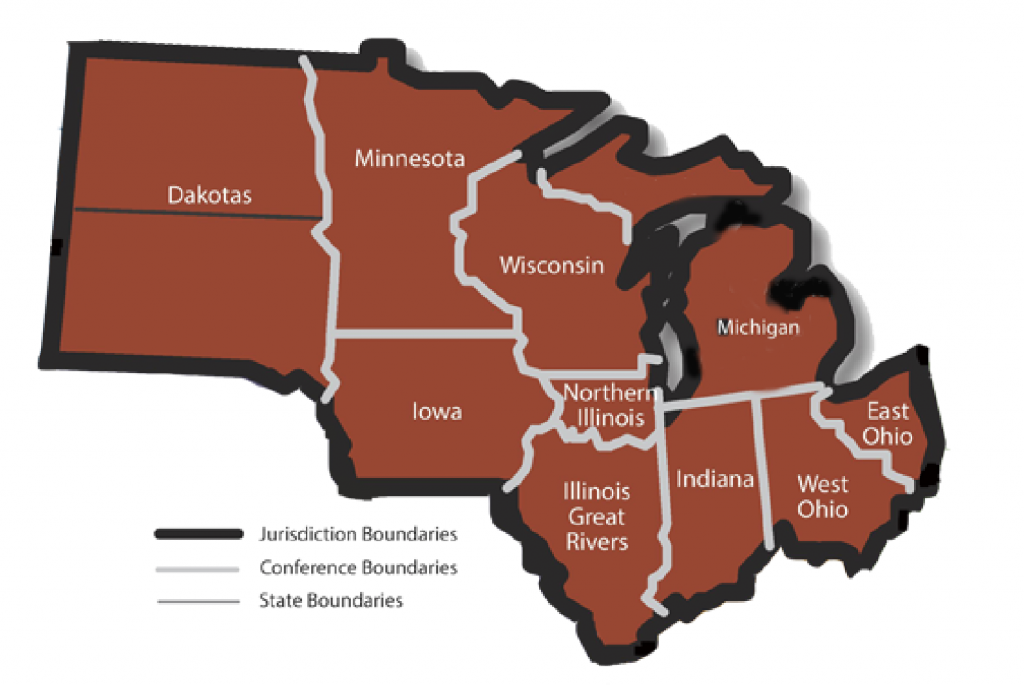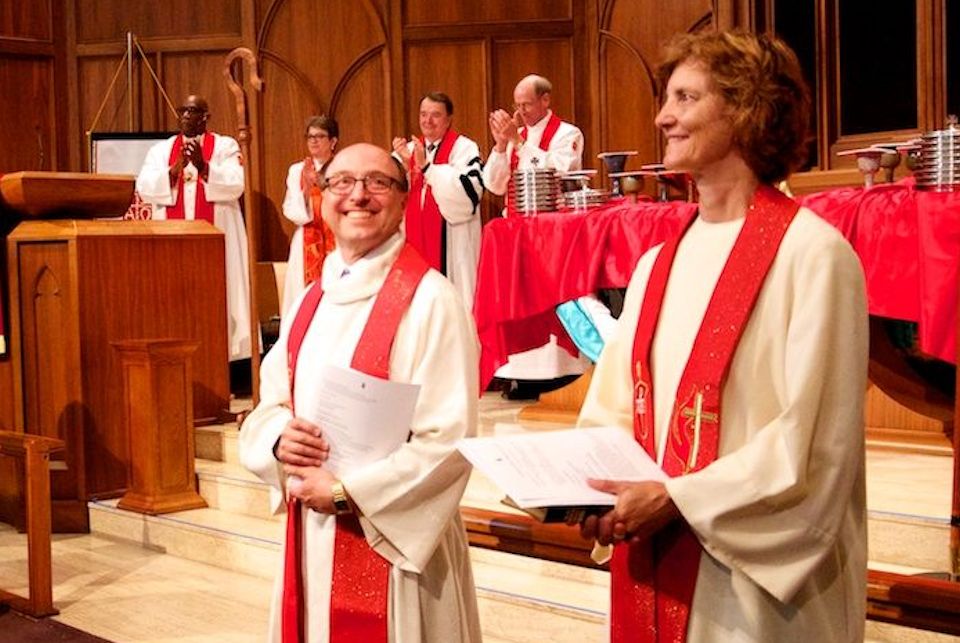Bishops David Bard, Laurie Haller, and John Hopkins are stepping in for one year to provide episcopal leadership in two areas where Bishops Bruce Ough and Sally Dyck are retiring.
KAY DEMOSS
Senior Content Editor
On July 7, 2020, the North Central Jurisdiction College of Bishops announced a plan proposed to and approved by the Council of Bishops of The United Methodist Church. The plan addresses the need for episcopal leadership for 2021 following the vocational retirements of Bishops Sally Dyck and Bruce Ough (¶408.2b), and the postponement of episcopal elections during the current COVID-19 pandemic. The retirements of Bishops Dyck and Ough have been approved by the NCJ Committee on the Episcopacy and become effective January 1, 2021.
The interim assignments begin on January 1, 2021, and involve Bishop David Bard (Michigan) and Bishop Laurie Haller (Iowa) as partners in the leadership of the Dakotas/Minnesota Area. Bishop Haller will assume primary supervisory responsibility for the Dakotas Conference, and Bishop Bard will assume primary supervisory responsibility for the Minnesota Conference. Their expanded leadership roles will continue no later than December 31, 2021 (¶409.3).
To serve the Northern Illinois Conference, Bishop John Hopkins retired, will be appointed from January 1, 2021, until another bishop is assigned, but no later than December 31, 2021.

On May 27, 2020, Bishop Bard, President of the NCJ College of Bishops, announced Phase 1 of a plan for episcopal oversight. At that time, he added, “By June 30 of this year, the NCJ College of Bishops will submit a plan to the Council of Bishops for NCJ leadership in 2021 for both Northern Illinois and Dakotas-Minnesota areas.” This is that plan.
Bard explained, “The primary impetus for Episcopal Leadership Task Force was a joint recommendation of the College of Bishops and the Committee on the Episcopacy to the jurisdiction that we move from nine to eight active bishops for the 2020-2024 quadrennium.”
In devising this plan to fill episcopal vacancies, and in accordance with ¶407 of The Book of Discipline of The United Methodist Church, the NCJ College of Bishops consulted with retired colleagues, and with retired colleagues outside the jurisdiction. The North Central Jurisdictional Committee on the Episcopacy, the area Committees on the Episcopacy, and Cabinets for the two areas needing bishops for 2021 were also included in the conversation that produced this plan. The College states, “We offer a plan we think is deeply responsive to the missional needs of these areas, of our jurisdiction, and of the missional and fiduciary needs of The United Methodist Church in this unprecedented time.”

Bishop Bard has further words for the Michigan Area that he has served since September of 2016. “We continue to live in unprecedented times, times which ask much of each of us.” Looking ahead to the 12 months of interim service, he added, “I am very pleased to be working with Bishop Laurie Haller, a person many of you know well, to provide episcopal leadership for the Dakotas/Minnesota area.”
Bard offered a glimpse of the next steps. “I am also aware that my leadership in Minnesota will mean changes in my schedule and availability here in the Michigan Conference. I expect that in the next couple of months, I will begin working with the leadership of the Minnesota Conference, for which I will have primary supervisory responsibility, to determine how best to serve as an interim bishop for them, consulting with Bishop Haller and the leadership of the Dakotas Conference.” Bard noted that both the Minnesota and Dakotas conferences had developed significant e-meeting capacities, and he will take full advantage of those administrative possibilities.
“I know this will stretch me and stretch us all,” Bard concluded. “We have solid staff leadership here in Michigan, and both the Dakotas and Minnesota are also blessed with exceptional leadership. We will make this work for the sake of the mission of Jesus Christ through The United Methodist Church.”
Two laywomen from Michigan serve on the Episcopal Leadership Task Force of the North Central Jurisdiction. Laura Witkowski points out that the work of the task force focuses on 2022 and beyond. Witkowski said, “The task force needed to wait for this decision to be made in order to move forward. It was difficult to think creatively while the uncertainty of assignments of bishops in 2021 was in the back of everyone’s mind.” She anticipates the work ahead. “This will help the task force move forward and, hopefully, to get to a creative space in thinking about 2022, as the jurisdiction moves from nine to eight bishops.”
Nichea Ver Veer Guy reflects, “We could not have predicted this path that Covid-19 has put before us. Not only has it impacted the directions of many of our Conference’s ministries, but it has also impacted episcopal leadership.” Yet, she rejoices in the spiritual gifts available. “It is important during this awkward time of episcopal transition in the North Central Jurisdiction, to have the solid, experienced leadership needed to guide conferences on their journey, especially to those conferences where their bishops are retiring. The ruggedness of that path has created a challenge.” Guy expressed hope for the future. “Our Episcopal leaders have been the steady compass guiding us through. I am confident that these bishops (Hopkins, Haller, and Bard) are the right leaders to shepherd these conferences through this interim time toward the episcopal election and assignments in the fall of 2021.”
The NCJ College of Bishops asks for prayers as they implement this plan for episcopal oversight.
Last Updated on September 20, 2022

